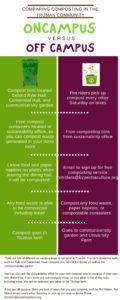

Every year, American households waste more than 294 million tons of organic matter. Most of us pitch this matter into the trash, where it goes to a landfill, sealed in a plastic bag, where it decomposes. When this matter decomposes poisonous gases are created. In short, we turn our kitchen scraps into poisons!
Composting is a great way to solve that problem! Compost is a mixture
of various decaying organic substances used for fertilizing soil. There are many different items that are compostable. Some compostable items are vegetable peelings, fruit waste, teabags, plant prunings, grass cuttings, dead leaves, paper and dryer sheets. Almost all food waste is compostable. Composting is an important process that helps us eliminate food waste. This is not the only benefit either! Benefits include improved soil structure as well as providing a balanced source of nutrients to the plants we grow. These plants eventually grow and end up on our plates!
So you may be asking yourself, how does composting work? Once our food scraps collect in a composting bin, the organic material is transformed into compost through microorganisms, enzymes and fungi. To keep it simple, these organisms help organic material decompose into what we know as compost. The optimal environment is key for a fast composting process. Optimal conditions include having a proper balance of carbon, oxygen, nitrogen and water.
You may not realize it, but composting is almost everywhere you look! At Truman State University, you can find composting bins behind Centennial and Ryle halls. In our dining halls, everything that is sent back as food waste is composted. After all of the waste has properly composted, it is taken to the Communiversity garden or the University Farm. The farm then uses the food that our compost helped grow and sends it back into our dining halls. Overall, composting is a key part of managing food waste within the environment. Not only does composting help us remove waste, but it also helps in the growth of new plants. Be sure that you are doing your part in helping to save the environment. After all, composting is a great way to do so!
Submitted by:
Dominic Schrader and Hayden Shay
